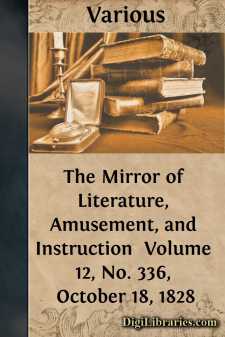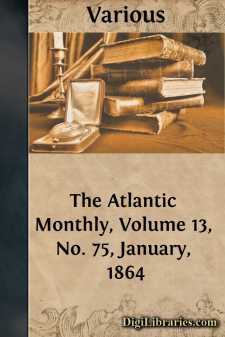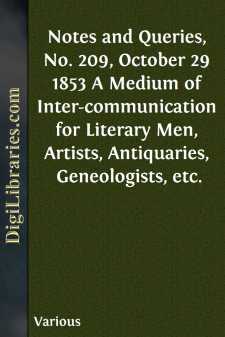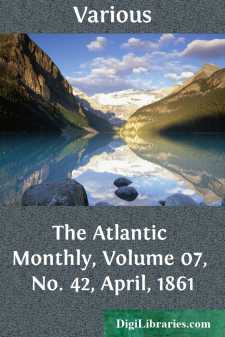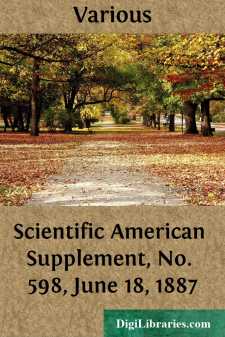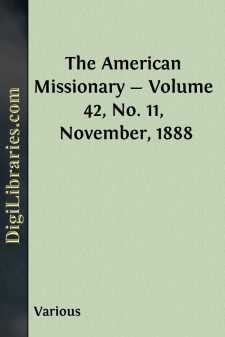Periodicals
- Art 27
- Children's periodicals 59
- Entertainment 5
- Food/Wine 2
- Games/Humor 455
- General 661
- Health 1
- History 53
- House/Home 1
- Regional 62
- Science/Nature 118
- Transportation 10
Periodicals Books
Sort by:
by:
Various
Nitro-Glycerin. Professor Doremus of this city was called as a witness at the inquest upon the bodies of the unfortunate persons killed by the recent explosion at Bergen, N.J. The Professor having previously analyzed some of the explosive mixture, testified as follows:—"I have subjected it to chemical analysis, and find it to correspond to the formula C_{6}, H_{3}, O_{3}, and NO_{5}; it is well...
more...
by:
Various
Richmond Palace Richmond has comparatively but few antiquarian or poetical visiters, notwithstanding all its associations with the ancient splendour of the English court, and the hallowed names of Pope and Thomson. Maurice sings, To thy sequester'd bow'rs and wooded height, That ever yield my soul renew'd delight, Richmond, I fly! with all thy beauties fir'd, By raptur'd poets...
more...
by:
Various
GOVERNOR JOHN WINTHROP IN OLD ENGLAND. Our magazine was introduced to the world bearing on the cover of its first number a vignette of the portraiture of the ever honored and revered John Winthrop, first Governor of the Colony of Massachusetts Bay. The effigies expressed a countenance, features, and a tone of character in beautiful harmony with all that we know of the man, all that he was and did....
more...
by:
Various
SIR EDWARD DERING'S HOUSEHOLD BOOK, A.D. 1648-52. About ten years since, I remember seeing, in the hands of a London bookseller, a curious MS. purporting to be the "Household Book of Receipts and Expences of Sir Edward Dering, Bart., of Surrenden Dering, Kent, from Lady-Day, 1648, to April, 1652." It was a think folio, in the original binding, entirely in the hand-writing of the...
more...
by:
Various
THE FOUNTAIN OF HAPPINESS. The source and fullness of created good is the knowledge and enjoyment of God. "Give what thou wilt, without thee we are poor; and with thee rich, take what thou wilt away." The wicked are like a ship's crew at sea, carried by the winds upon unknown waters, without peace or safety until they can renew communications with the shore. A man alienated from his God is...
more...
by:
Various
THE SCOTTISH NATIONAL RECORDS. The two principal causes of the loss of these records are, the abstraction of them by Edward I. in 1292, and the destruction of a great many others by the reformers in their religious zeal. It so happens that up to the time of King Robert Bruce, the history is not much to be depended on. A great many valuable papers connected with the ancient ecclesiastical state of...
more...
by:
Various
APRIL DAYS. "Can trouble dwell with April days?" In Memoriam. In our methodical New England life, we still recognize some magic in summer. Most persons reluctantly resign themselves to being decently happy in June, at least. They accept June. They compliment its weather. They complained of the earlier months as cold, and so spent them in the city; and they will complain of the later months as...
more...
by:
Various
THE HAVRE MARITIME EXHIBITION. The Havre Maritime Exhibition opened on the 7th of May. Will this exhibition awaken general interest, or will it prove a local affair simply? This is a secret of the weeks that are to follow. Should nothing chance to discourage the general interest that surrounds Havre, to dampen the enthusiasm of the public, or to act to the prejudice of the exhibitors, whose very...
more...
by:
Various
American Missionary Association NOT QUITE FREE. In the November MISSIONARY of last year, the financial statement bore the simple and joyous heading "FREE." This year we are compelled to prefix two qualifying words. Our books closed September 30, with a balance of $5,641.21 on the wrong side. While we regret that there should be any debt, we rejoice that it is no larger. The receipts applicable...
more...
by:
Various
THE IDEAL TENDENCY. We are all interested in Art; yet few of us have taken pains to justify the delight we feel in it. No philosophy can win us away from Shakspeare, Plato, Angelo, Beethoven, Goethe, Phidias,—from the masters of sculpture, painting, music, and metaphor. Their truth is larger than any other,—too large to be stated directly and lodged in systems, theories, definitions, or formulas....
more...



